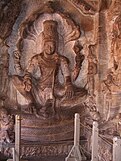Wikipedia:Today's featured article/requests/Political history of medieval Karnataka
Previous nomination
|
|---|
Political history of medieval Karnataka[edit]
The result was: not scheduled by Gog the Mild (talk) 21:55, 25 July 2022 (UTC) The political history of medieval Karnataka spans the 4th–16th centuries CE in the Karnataka region of India. In the 4th century, the Kadamba Dynasty of Banavasi were the earliest of the native rulers to conduct administration in the Kannada language. In south Karnataka, the Western Gangas of Talakad were contemporaries of the Kadambas. These were followed by the Badami Chalukya Empire, the Rashtrakuta Empire, the Western Chalukya Empire, the Hoysala Empire and the Vijayanagara Empire, all patronising the Hindu religion while showing tolerance to the new cultures arriving from the west. The Muslim invasion of the Deccan resulted in the breaking away of the feudatory sultanates in the 14th century. The rule of the Bahamani Sultanate of Bidar and the Bijapur Sultanate caused a mingling of Hindu traditions with Islamic culture in the region. The fall of the Vijayanagara Empire in 1565 brought about a slow disintegration of Kannada-speaking regions into minor kingdoms that struggled to maintain autonomy. (Full article...)
Darjeeling[edit]
The result was: scheduled for Wikipedia:Today's featured article/August 15, 2022 by Gog the Mild (talk) 21:56, 25 July 2022 (UTC)  Mist enshrouded on most days, the world's third highest mountain, Kangchenjunga is unforgettable behind Darjeeling when the mist lifts. Darjeeling is a town in the Eastern Himalayas in India on the slopes below which Darjeeling tea is grown as far as the eye can see. Up those same slopes, ascending some 7,000 feet every day, the Darjeeling Himalayan Railway gives tourists the experience of late industrial-age steam travel. Both exist because in the early 19th century during East India Company rule in India, Darjeeling was self-consciously founded as a summer retreat for the British. Not just the cottages, the tea and the train, but residential schools for the children of domiciled British soon came to dot Darjeeling's hills. In order to make this possible, thousands of labourers were brought in from the surrounding kingdoms. Their descendants, who constitute the vast majority of Darjeeling's residents, have given the town a cosmopolitan ethnicity. In their many neighbourhoods which fringe the town at lesser heights and lower incomes, the Nepali language has found a home outside Nepal and the Tibetan language outside Tibet. Their goal for economic well-being and political identity is the unmade tryst with destiny that India self-consciously pondered on its first independence day this day 75 years ago. (Full article...)
|
Political history of medieval Karnataka
[edit]
The political history of medieval Karnataka spans the 4th–16th centuries CE in the Karnataka region of India. In the 4th century, the Kadamba Dynasty of Banavasi were the earliest of the native rulers to conduct administration in the Kannada language. In south Karnataka, the Western Gangas of Talakad were contemporaries of the Kadambas. These were followed by the Badami Chalukya Empire, the Rashtrakuta Empire, the Western Chalukya Empire, the Hoysala Empire and the Vijayanagara Empire, all patronising the Hindu religion while showing tolerance to the new cultures arriving from the west. The Muslim invasion of the Deccan resulted in the breaking away of the feudatory sultanates in the 14th century. The rule of the Bahamani Sultanate of Bidar and the Bijapur Sultanate caused a mingling of Hindu traditions with Islamic culture in the region. The fall of the Vijayanagara Empire in 1565 brought about a slow disintegration of Kannada-speaking regions into minor kingdoms that struggled to maintain autonomy. (Full article...)
- Most recent similar article(s): Western Chalukya Empire (2 May 2024)
- Main editors: Dineshkannambadi
- Promoted: June 4, 2007
- Reasons for nomination: Forgotten about article from 2007. Dispute above is mostly about running it on the anniversary of Indian independence, which wasn't a good fit for a date.
- Support as nominator. Harizotoh9 (talk) 21:03, 17 May 2024 (UTC)
- We already have two articles in the same category lined up for July, so this will probably get pushed into August, but feel free to discuss it. I see there was some opposition to the previous TFAR nomination but I haven't looked at that closely. - Dank (push to talk) 22:00, 17 May 2024 (UTC)
- No rush, it could even be run in September. Harizotoh9 (talk) 02:21, 18 May 2024 (UTC)
- @Harizotoh9: I'm going to check with Gog, who will schedule August, to see what he recommends. - Dank (push to talk) 02:32, 3 June 2024 (UTC)
- No rush, it could even be run in September. Harizotoh9 (talk) 02:21, 18 May 2024 (UTC)

